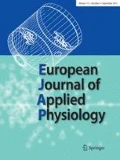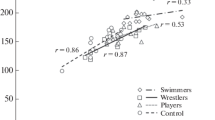Abstract
Horses display remarkable aerobic capabilities, attaining during muscular exercise a maximal rate of oxygen consumption about 30-fold higher than the resting value, and 2.5-fold higher than that of other mammals of similar body mass. Under these circumstances an enormous mechanical burden is expected to impinge on the equine respiratory pump and regulatory mechanisms aiming to minimize this load may play an important role in determining the adequacy of the respiratory system to the metabolic requirements. The behaviour of the respiratory system has been investigated in horses at rest and during treadmill locomotion at different velocities and gaits. During exercise hyperpnoea, horses exhibit a significant reduction in the lung viscous resistance not observed in other mammals, such as dogs and humans. Therefore, the exercise-dependent increase in the rate of mechanical work of breathing is lower in the horse than in other mammals. This increase in the equine airway patency during exercise appeared to be mainly determined by the pattern of laryngeal movements. In fact, during exercise, the laryngeal cross-sectional area, determined with a video-endoscopic imaging technique at the level of rima glottidis (CSArg), undergoes during inspiration an increase averaging up to over 4 times the resting expiratory values. Although a significant linear correlation was found between CSArg and minute ventilation (V̇ E), the laryngeal activation contributes to increase lung conductance only when CSArg is narrower than the tracheal section. It appears therefore that in exercising horses pulmonary resistive features are finely controlled to reduce the mechanical load supported by the respiratory muscles and to counterbalance the increase in the ventilatory energetic requirements inherent in the remarkably enhanced aerobic performance observed in this species.











Similar content being viewed by others
References
Ainsworth M, Eveleigh JW (1952) A method of estimating lung airway resistance in humans. Ministry of Supply, Chemical Defence Experimental Establishment (Porton Technical Paper 320)
Alexander RMcN (1988) Elastic mechanisms in animal movements. Cambridge University Press, Cambridge
Bartlett D Jr (1989) Respiratory functions of the larynx. Physiol Rev 69:33–57
Bartlett D Jr, Remmers JE, Gautier H (1973) Laryngeal regulation of respiratory airflow. Respir Physiol 18:194–204
Bramble DM, Carrier DR (1983) Running and breathing in mammals. Science 219:251–256
Brancatisano TP, Collet PW, Engel LA (1983) Respiratory movements of the vocal cords. J Appl Physiol 54:1825–1829
Butler PJ, Woakes AJ, Smale K, Roberts CA, Hillidge CJ, Snow DH, Marlin DJ (1993) Respiratory and cardiovascular adjustments during exercise of increasing intensity and during recovery in thoroughbred racehorses. J Exp Biol 179:159–180
Clark FJ, von Euler C (1972) On the regulation of depth and rate of breathing. J Physiol (Lond) 222:267–295
Cohen MI (1975) Phrenic and recurrent laryngeal discharge patterns and the Hering-Breuer reflex. Am J Physiol 228:1489–1496
Constantinopol M, Jones JH, Weibel ER, Taylor CR, Lindholm A, Karas RH (1989) Oxygen transport during exercise in large mammals II. Oxygen uptake by the pulmonary gas exchanger. J Appl Physiol 67:871–878
Cook WR (1981) Some observations on form and function of the equine upper airway in health and disease. II. Larynx. Proc Am Ass Equine Pract 27:393–451
England SJ, Bartlett D Jr (1982) Changes in respiratory movements of the human vocal cords during hyperpnea. Appl Physiol 52:780–785
England SJ, Bartlett D Jr, Daubenspeck JA (1982) Influence of human vocal cord movements on airflow and resistance during eupnea. J Appl Physiol 52:773–779
Evans DL, Rose RJ (1988) Cardiovascular and respiratory responses to submaximal exercise training in the thoroughbred horse. Pflugers Arch 411:316–321
Gautier H, Remmers JE, Bartlett D Jr (1973) Control of the duration of expiration. Respir Physiol 18:205–221
Gehr P, Erni H (1980) Morphometric estimation of pulmonary diffusion capacity in two horse lungs. Respir Physiol 41:199–210
Gillespie JR, Tyler WS, Eberly VE (1966) Pulmonary ventilation and resistance in emphysematous and control horses. J Appl Physiol 21:416–422
Goulden BE, Barnes GRG, Quinlan TJ (1976) The electromyographic activity of intrinsic laryngeal muscles during quiet breathing in the anaesthetized horse. N Z Vet J 24:157–162
Green JH, Neil E (1955) The respiratory function of the laryngeal muscles. J Physiol (Lond) 129:134–141
Holcombe SJ, Derksen FJ, Berney C, Becker AC, Horner NT (2001) Effect of topical anesthesia of the laryngeal mucosa on upper airway mechanics in exercising horses. Am J Vet Res 62:1706–1710
Hörnicke H, Meixner R, Pollmann U (1983) Respiration in exercising horses. In: Snow DH, Persson SGB, Rose RJ (eds) Equine exercise physiology. Granta, Cambridge, pp 17–22
Jones JH, Longworth KE, Lindholm A, Conley KE, Karas RH, Kayar SR, Taylor CR (1989) Oxygen transport during exercise in large mammals I. Adaptive variation in oxygen demand. J Appl Physiol 67:862–870
Kayar SR, Hoppeler H, Lindstedt SL, Claassen H, Jones JH, Essen-Gustavsson B, Taylor CR (1989) Total muscle mitochondrial volume in relation to aerobic capacity of horses and steers. Pflugers Arch 413:343–347
Koterba AM, Kosch PC, Beech J, Whitlock T (1988) Breathing strategy of the adult horse (Equus caballus) at rest. J Appl Physiol 64:337–346
Lafortuna CL, Saibene F (1991) Mechanics of breathing in horses at rest and during exercise. J Exp Biol 155:245–259
Lafortuna CL, Minetti AE, Mognoni P (1984) Inspiratory flow pattern in humans. J Appl Physiol 57:1111–1119
Lafortuna CL, Reinach E, Saibene F (1996) The effects of locomotor-respiratory coupling on the pattern of breathing in horses. J Physiol (Lond) 492:587–596
Lafortuna CL, Albetini M, Ferrucci F, Zucca E, Braghieri M, Clement MG, Saibene F (1999) Laryngeal movements during the respiratory cycle measured with an endoscopic imaging technique in the conscious horse at rest. Exp Physiol 84:739–746
Leith DE (1983) Comparative mammalian respiratory mechanics. Am Rev Resp Dis 128:S77–S82
Murakami Y, Kirchner JA (1972) Respiratory movements of the vocal cords. An electromyographic study in the cat. Laryngoscope 82:454–467
Purchase IFH (1966) The measurement of compliance and other respiratory parameters in horses. Vet Rec 78:613–618
Saibene F, Mognoni P, Aguggini G, Clement MG (1981) Work of breathing in dog during exercise. J Appl Physiol 50:1087–1092
Sant'Ambrogio G, Matthew OP (1988) Control of upper airway muscles. NIPS 3:167–172
Seeherman HJ, Taylor CR, Maloiy GMO, Armstrong RB (1981) Design of the mammalian respiratory system. II. Measuring maximum aerobic capacity. Respir Physiol 44:11–23
Snow DH, Rose RJ (1981) Hormonal changes associated with long distance exercise. Equine Vet J 13:195–197
Taylor CR, Maloiy GMO, Weibel ER, Langman VA, Kamau JMZ, Seeherman HJ, Heglund NC (1981) Design of the mammalian respiratory system. III. Scaling maximum aerobic capacity to body mass: wild and domestic mammals. Respir Physiol 44:25–37
Taylor CR, Karas RH, Weibel ER, Hoppeler H (1987) Adaptive variation in the mammalian respiratory system in relation to energetic demand: II. Reaching the limits to oxygen flow. Respir Physiol 69:7–26
Thomas DP, Fregin GF (1981) Cardiorespiratory and metabolic responses to treadmill exercise in the horse. J Appl Physiol 50:864–868
Weibel ER, Taylor CR, Gehr P, Hoppeler H, Mathieu O, Maloiy GMO (1981) Design of the mammalian respiratory system. IX. Functional and structural limits for oxygen flow. Respir Physiol 44:151–164
Weibel ER, Taylor CR, Hoppeler H (1991) The concept of symmorphosis: A testable hypothesis of structure-function relationship. Proc Natl Acad Sci USA 88:10357–10361
Woakes AJ, Butler PJ, Snow DH (1987) The measurement of respiratory airflow in exercising horses. In: Gillespie JR, Robinson NE (eds) Equine exercise physiology 2. ICEEP, Davis, Calif., pp 194–205
Author information
Authors and Affiliations
Corresponding author
Rights and permissions
About this article
Cite this article
Lafortuna, C.L., Saibene, F., Albertini, M. et al. The regulation of respiratory resistance in exercising horses. Eur J Appl Physiol 90, 396–404 (2003). https://doi.org/10.1007/s00421-003-0925-0
Accepted:
Published:
Issue Date:
DOI: https://doi.org/10.1007/s00421-003-0925-0



